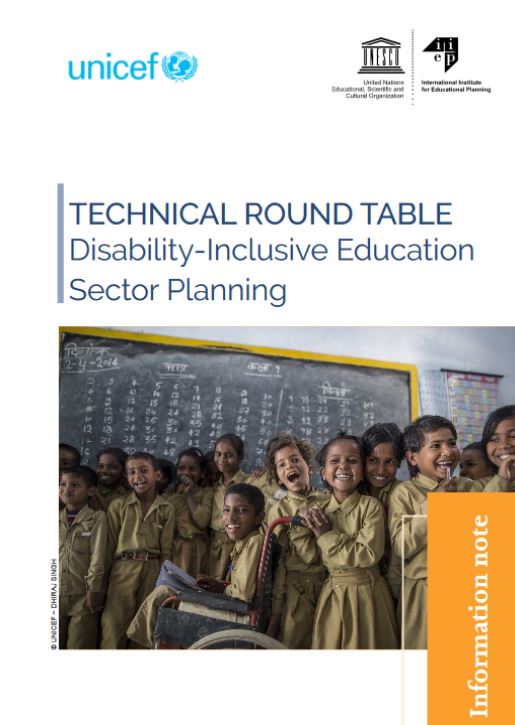uni159600_small.png

Children with disabilities are often invisible in education sector planning. Key actors from eight countries will meet to discuss challenges and new opportunities for inclusive quality education.
The UNESCO International Institute for Educational Planning (IIEP-UNESCO), in partnership with UNICEF, is hosting a technical Round Table from 18-20 July 2018 in Paris, France, to support ministries of education in planning education systems to include children with disabilities.
Children with disabilities remain one of the most excluded groups from education. Of the one billion persons with disabilities worldwide, 150 million are children, according to the World Health Organization. However, there is limited information on who these children are and what their individual needs may be. As a result, countries often do not know how to include children with disabilities in their national education systems. Persisting stigmas, unconducive school design, and a lack of teacher training and appropriate learning materials on inclusive education makes their access to school and learning even more difficult.
The upcoming Round Table will address these issues by bringing together government experts, development partners, and major national Disabled People’s Organizations from eight countries in sub-Saharan Africa and Asia and the Pacific*.
Participants will take stock of current practices and opportunities for disability-inclusive educational planning and explore ways to address critical data and capacity gaps. IIEP’s Virtual Campus will also host a two-week preparatory virtual phase for the participants from 2 July to 16 July, as well as an open livestreamed “Data Dive” with a disability data expert on 10 July (watch the video below or click here).
Quality education is a fundamental right for all children. Children with disabilities are no exception. It is also the bedrock on which to build global peace and promote sustainable development. Sustainable Development Goal 4 (SDG 4), with its focus on leaving no one behind, provides countries with an opportunity to transform their education systems to become more inclusive and equitable.
Inclusive education entails reaching out to all learners and addressing all forms of exclusion and inequalities in access, school participation, and learning outcomes. Effective models for inclusion can help children with disabilities flourish and ultimately play an important and active role in society. Inclusive education is also beneficial for all learners with its focus on diversity and quality and its responsiveness to the different needs of children.
After the Round Table, IIEP will continue its collaboration with UNICEF to develop an IIEP training offer on disability-inclusive education sector planning, starting with region-specific distance education courses.
Stay tuned for more information and updates from the event.
*The participating countries include Cambodia, Ethiopia, Fiji, Ghana, Kenya, Nepal, South Africa, and Viet Nam. They were invited to participate for their specific contributions to disability-inclusive planning.
Read more about this technical Round Table in the information note.
Watch the webcasts of the technical round table on inclusive education (all videos are available here):
Watch the webcast of the Data Dive webinar:






